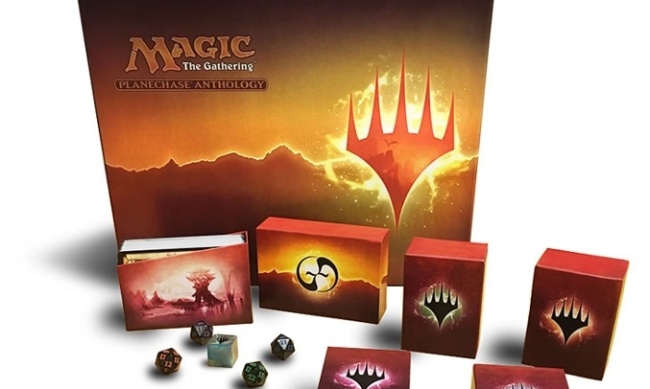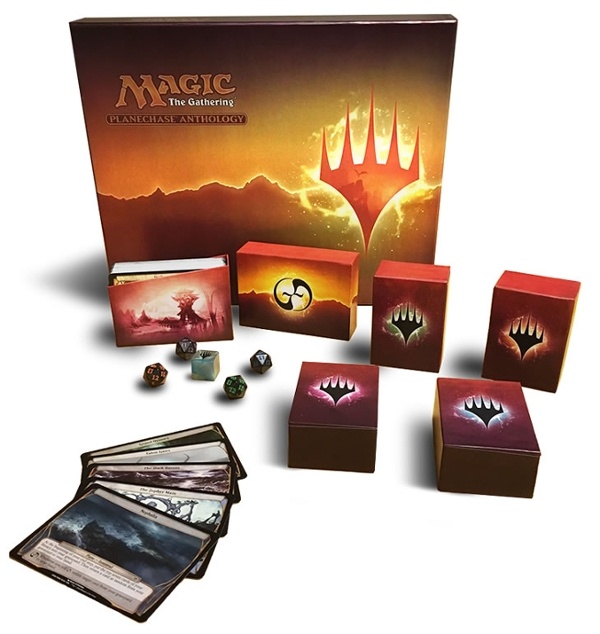Rolling for Initiative is a weekly column by Scott Thorne, PhD, owner of Castle Perilous Games & Books in Carbondale, Illinois and instructor in marketing at Southeast Missouri State University. This week, Thorne looks at discounting Wizards of the Coast's new Planechase Anthology in light of game theory.
Wizards of the Coast’s Planechase Anthology released this past Friday with an MSRP of $149.99 (see "Major Plans for 'Magic: The Gathering'"), but that price was reduced almost immediately by a series of discounts on the set, ranging from a relatively tiny discount to a new price of $139.99, to a pretty massive discount to a new price of $102.99. Considering why anyone would want to discount an extremely limited item like the Planechase Anthology, given that most stores received a maximum of ten copies, got me thinking about the Prisoner’s Dilemma, one of the basic concepts of game theory.
The classic example of the Prisoner’s Dilemma involves a fairly labored example of whether a pair of prisoners inform on each other to the benefit or detriment of the pair. A far better example comes from the 1970s National Hockey League before the League mandated players wear head protection. A player wearing a helmet was much less likely to suffer head injuries. However, wearing a helmet cuts down on the player’s peripheral vision, making them a less effective player on the ice.
So, consider two players competing for an open spot on an NHL team. Both are equally talented and both wear helmets to reduce the likelihood of injuries, giving both an equal chance at the spot. Now, one removes their helmet, improving their play and thus giving them an advantage in securing the spot, but also increasing the likelihood of injury. The other player thus has the choice of continuing to wear a helmet, reducing the likelihood of suffering injury, but also losing their chance of securing a spot on the team.
In short, if both players choose the safe option, both players remain safe and have an equal chance of securing a spot on the team. This is arguably the best option. The worst option is, of course, neither player wearing a helmet, giving them the same shot at the position but with greater chance of injury. If neither seeks an advantage over the other, both wind up in a superior position while, if one seeks an advantage over the other, both wind up in a poorer position.
Applying this concept to store sales of the Planechase Anthology, if all stores maintain the MSRP of $149.99, all stores benefit, making maximum profit, the best case scenario. However, should one store seek an advantage over the others, by reducing their price, and hence their profit, in order to garner additional sales, that store, by foregoing profit, puts themselves in a more advantageous position vis a vis the other stores. In order to compete, other stores may also chose to forego maximum profit by reducing their retail price on the Anthology, either meeting or exceeding that of the original store.
As with players in the NHL, if all stores work to maintain MSRP, all stores benefit to a greater degree. Should one store opt to seek sales through cutting the price, other stores have to decide if they wish to follow to maintain equilibrium or maintain MSRP in the hope that all sales will not follow the reduced pricing. However, if individual stores decide among each other not to reduce pricing, this could be construed as horizontal price fixing, a violation of the law.
In the NHL, an outside force, the League, eventually saw the harm players were doing to themselves and mandated all players must wear helmets, thus eliminating the advantage. Is that possible with products like the Planechase Anthology? Not so far.
The opinions expressed in this column are solely those of the writer, and do not necessarily reflect the views of the editorial staff of ICv2.com.

Column by Scott Thorne
Posted by Scott Thorne on November 28, 2016 @ 1:25 am CT



